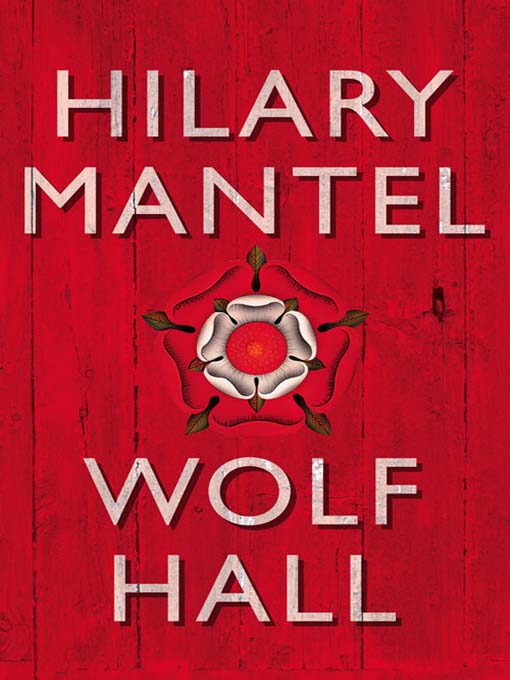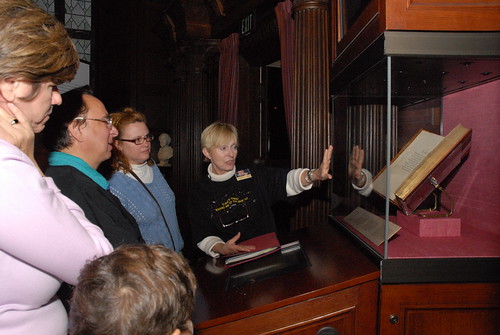
While Hilary Mantel’s Wolf Hall, my recommendation for docent summer reading is not the usual light fare, it is a “page turner.” This historical fiction won the 2009 Booker Prize, given to the best contemporary British fiction. Mantel’s recreation of sixteenth century London is so vivid and immediate that you feel you are living alongside the hero, Thomas Cromwell.
Cromwell was a self-made man if ever there was one, who rose to become Henry VIII’ right hand councilor, chief fixer and Lord Chancellor. He escaped from his brute of a blacksmith father to the continent where he was first a soldier, then a tradesman and artisan. En route he became an accomplished linguist. He also devised a memory system in order to retain all he learned. His intelligence, diplomacy, calm temperament and continual hard work were the foundation of his prosperity.
As the head of his own thriving household, he expanded his family to include the sons of poor relations and orphans whom he raised and trained in his management style. But even he is helpless before the toll the plague exacts on his family.
Through Cromwell’s wide ranging tastes, Mantel delves into the details of domestic life at that time. He has an eye for beautiful craftsmanship, especially in woven tapestries and cloth. A gourmet, he knows where to find the best provisions and how to train the cook to do them justice.
Mantel touches on the hot button issues of the day as Cromwell experiences them. First is the tension between the king and the Pope and Cardinal Wolsey, chief prelate in England, and Cromwell’s first patron, over the king’s desire to have his marriage to Queen Katharine annulled. Then there is the king’s passion for Anne Boleyn, who emerges as an unpleasant schemer.
As a logical, practical man, Cromwell secretly sympathizes with the nascent Protestant movement, which though branded as “heresy,” was favored by his City merchant friends. A dark thread in the book is the cruelty of the executions, especially burning at the stake as punishment for heresy.
Cromwell nimbly navigates the treacherous terrain of the court of Henry VIII, where the Boleyn family is in the ascendancy and tensions are high between them and the courtiers who are currently out of favor. Mantel describes the edginess of life at court, where the king has the power to create one peer and bankrupt another at a snap of his fingers.
The novel ends in 1535, in midstream, so to speak, when Henry VIII has just begun to confiscate Catholic religious property and assert himself as head of the church in England, and Anne Boleyn is still his queen. Princess Elizabeth is a baby being raised away from the court at Hatfield, where her half-sister, Mary, also resides. Henry is still hoping for a male heir.
If you read the novel, please let me know, Why is it titled Wolf Hall? And do you have recommendations for further reading about Henry VIII?
Cromwell was a self-made man if ever there was one, who rose to become Henry VIII’ right hand councilor, chief fixer and Lord Chancellor. He escaped from his brute of a blacksmith father to the continent where he was first a soldier, then a tradesman and artisan. En route he became an accomplished linguist. He also devised a memory system in order to retain all he learned. His intelligence, diplomacy, calm temperament and continual hard work were the foundation of his prosperity.
As the head of his own thriving household, he expanded his family to include the sons of poor relations and orphans whom he raised and trained in his management style. But even he is helpless before the toll the plague exacts on his family.
Through Cromwell’s wide ranging tastes, Mantel delves into the details of domestic life at that time. He has an eye for beautiful craftsmanship, especially in woven tapestries and cloth. A gourmet, he knows where to find the best provisions and how to train the cook to do them justice.
Mantel touches on the hot button issues of the day as Cromwell experiences them. First is the tension between the king and the Pope and Cardinal Wolsey, chief prelate in England, and Cromwell’s first patron, over the king’s desire to have his marriage to Queen Katharine annulled. Then there is the king’s passion for Anne Boleyn, who emerges as an unpleasant schemer.
As a logical, practical man, Cromwell secretly sympathizes with the nascent Protestant movement, which though branded as “heresy,” was favored by his City merchant friends. A dark thread in the book is the cruelty of the executions, especially burning at the stake as punishment for heresy.
Cromwell nimbly navigates the treacherous terrain of the court of Henry VIII, where the Boleyn family is in the ascendancy and tensions are high between them and the courtiers who are currently out of favor. Mantel describes the edginess of life at court, where the king has the power to create one peer and bankrupt another at a snap of his fingers.
The novel ends in 1535, in midstream, so to speak, when Henry VIII has just begun to confiscate Catholic religious property and assert himself as head of the church in England, and Anne Boleyn is still his queen. Princess Elizabeth is a baby being raised away from the court at Hatfield, where her half-sister, Mary, also resides. Henry is still hoping for a male heir.
If you read the novel, please let me know, Why is it titled Wolf Hall? And do you have recommendations for further reading about Henry VIII?


